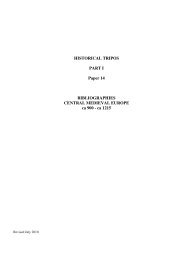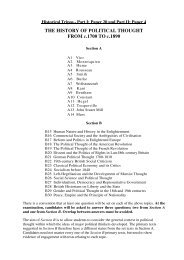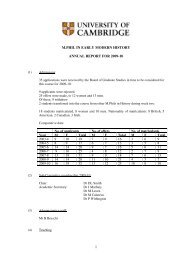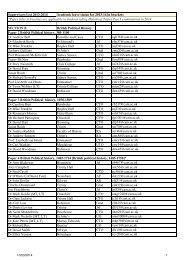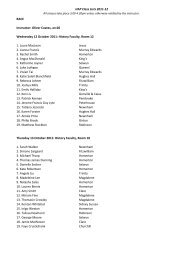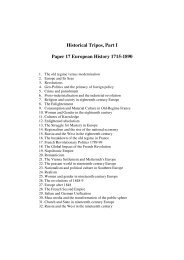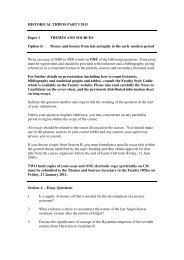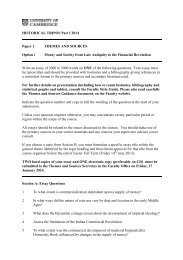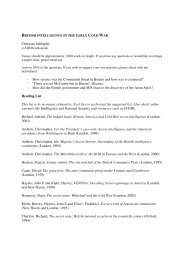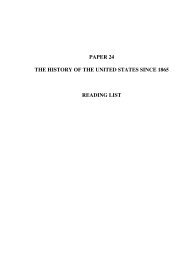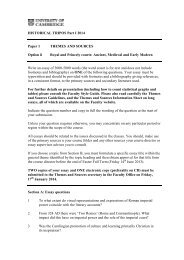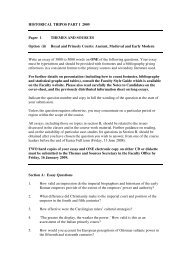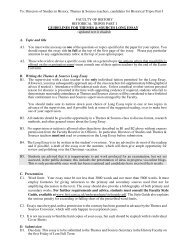Course Handbook - Faculty of History - University of Cambridge
Course Handbook - Faculty of History - University of Cambridge
Course Handbook - Faculty of History - University of Cambridge
You also want an ePaper? Increase the reach of your titles
YUMPU automatically turns print PDFs into web optimized ePapers that Google loves.
technological and financial innovations as focal points <strong>of</strong> asset-price bubbles. By bringing<br />
new capital into markets, asset-price bubbles serve first to foster and then, by their collapse,<br />
to resolve what economists describe as the ‘lemons problem.’ Those who cannot tell good<br />
wine from bad will overpay for the latter but reject the former as commanding too high a<br />
price. Yet this is also how untested ideas attract financing. In Weeks 4, 5 and 6, students will<br />
learn about the development <strong>of</strong> international capital markets and their role in financing both<br />
state and private ventures. Students will decide for themselves what both behavioral finance<br />
and closely historicized studies <strong>of</strong> market microstructure can <strong>of</strong>fer historians <strong>of</strong> financial<br />
capitalism. Students will learn why modern financial and economic historians consider<br />
interpretations <strong>of</strong> asset-price bubbles pivotal to theoretical debates about rational and<br />
efficient markets. In the second half <strong>of</strong> the course, we will apply these models to three<br />
nineteenth and twentieth-century financial bubbles. Students will then develop their own<br />
research projects in which they interrogate the market realities behind a financial bubble <strong>of</strong><br />
their choosing.<br />
General Reading<br />
• Eichengreen, Barry. Globalizing Capital: A <strong>History</strong> <strong>of</strong> the International Monetary<br />
System (Princeton <strong>University</strong> Press, 2008).<br />
• Kindleberger, Charles. Manias, Panics and Crashes: A <strong>History</strong> <strong>of</strong> Financial Crisis.<br />
(John Wiley & Sons, 2000).<br />
• Michie, Ranald. The Global Securities Market (Oxford <strong>University</strong> Press, 2008)<br />
• Vogel, Harold. Financial Market Bubbles and Crashes (<strong>Cambridge</strong> <strong>University</strong> Press,<br />
2009).<br />
6) Language and society (a course taught by the MPhil in Early Modern <strong>History</strong>)<br />
Dr P Withington<br />
This course invites students to think about what words meant in early-modern Europe – not<br />
merely to social and intellectual elites (though they are certainly part <strong>of</strong> the mix) but also<br />
ordinary men and women. In so doing it encourages reflection about the implications <strong>of</strong><br />
these meanings – and their changes and continuities over time – for social attitudes,<br />
relationships, and practices. These aims reflect not only the impact <strong>of</strong> the infamous<br />
‘linguistic turn’ on early modern studies, but also that some <strong>of</strong> the most interesting recent<br />
work on language and meaning has been done at the intersection between literary,<br />
intellectual, and social history. To this end students will discuss the way historians have<br />
approached language and discourse over the past forty years and consider the cultural<br />
movements that transformed European vernaculars from the later fifteenth century. They<br />
will be introduced to the kinds <strong>of</strong> evidence available to historians and the possibilities <strong>of</strong><br />
interpretation. They will also think about particular words and vocabularies that have<br />
attracted especial historical attention. In the final week they will research a word <strong>of</strong> their<br />
own choice. The focus will be on English, though there will be opportunities for students to<br />
consider words in other vernaculars if they so wish. There will be a moderate amount <strong>of</strong><br />
preparation for each class, and students will be expected to give a short presentation over the<br />
course <strong>of</strong> the term. Assessment will be by an essay on one aspect <strong>of</strong> the course (title agreed<br />
with the tutor) and by evidence <strong>of</strong> satisfactory participation.<br />
Classes are likely to cover:<br />
• Approaches to language and society<br />
• Humanism and vernacularization<br />
• Sources and interpretation<br />
• Economic vocabularies<br />
• Political language<br />
• Language and social identity<br />
• Personal research<br />
Some Suggestions for Introductory Reading<br />
Robert M. Burns, ed., Historiography. Critical Concepts in Historical Studies (New York,<br />
2005), Part One.<br />
12




